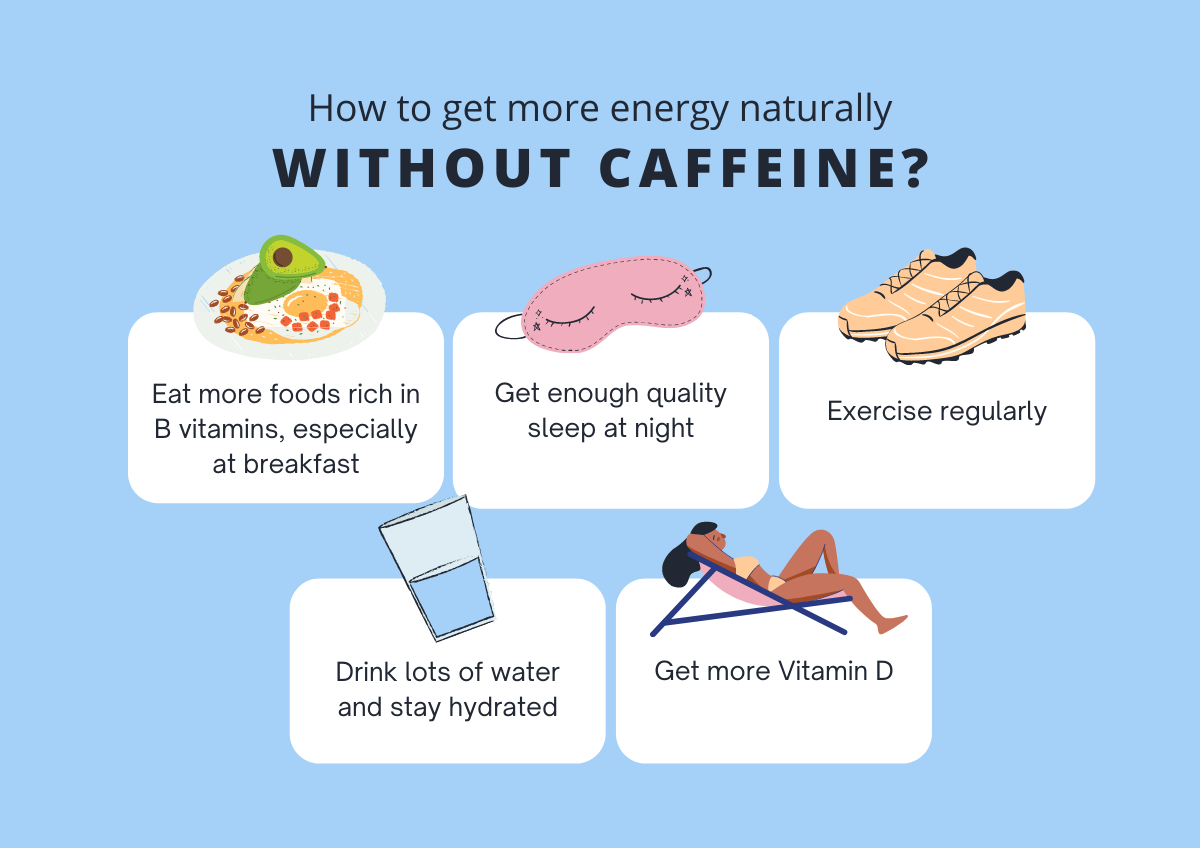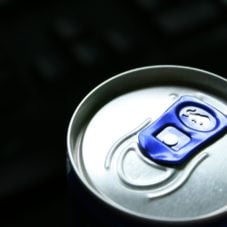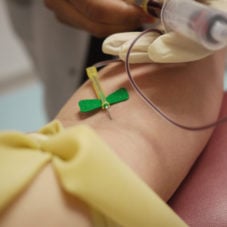Coffee jumpstarts the day for millions of people, but did you know some cannot tolerate caffeine? Even a tiny amount of caffeine can lead to sweaty palms and racing heartbeats! I know, totally unimaginable if you love coffee and can’t live without it.
So, today, let’s talk about caffeine intolerance, its symptoms, what causes it, and how to get caffeine-free energy throughout the day.
Table of Contents
What’s the #1 source of caffeine?
Caffeine is the natural stimulant of choice for millions of people worldwide, with coffee being the most popular source. Statista reports that global coffee consumption was at 166.63 million 60-kg bags last year (1). If we convert that to 1-kilogram bags, that would be equivalent to 9,963,780,000 kilograms of coffee consumed worldwide in one year. This would translate to about 27.3 million kilograms of coffee consumed EVERY DAY!
As to how much caffeine (measured in milligrams) is in a cup of coffee, well, it’s not easy to calculate. A Google search is a good start, but the numbers will ultimately depend on many factors. This includes the type of coffee beans, the type of roast, the preparation (brew, espresso, instant, etc.), and serving size (2).
Apart from coffee, what are other sources of caffeine?
The second most prominent source of caffeine is tea. Other natural sources are chocolate (from cacao beans), guarana berries (used in energy drinks) and kola nuts (used in cola beverages). Even “decaf” coffee and tea also have caffeine in it, albeit in small amounts (3).
Here are a few other possible sources of caffeine:
- Coffee and tea-flavored baked goods and desserts
- Energy drinks
- Soft drinks
- Vitamin supplements
- Some medications
If you have caffeine intolerance, stay away from these products. Check out this comprehensive database from Caffeine Informer – you may be surprised at the caffeine content of your favorite beverages!

What’s the difference between caffeine sensitivity and caffeine tolerance?
Both are closely related but there are underlying differences. Genetics plays a role in caffeine sensitivity. Some people can process and metabolize caffeine faster, while others metabolize slowly. There are three levels of caffeine sensitivity:
- Hyposensitive – can tolerate more than the recommended dosage with no problems. About 10% of the population carries the gene that allows them to drink large amounts of caffeine, without the nasty side effects (4).
- Normal sensitivity – this is the bracket most people fall under, a.k.a. the group who can consume the recommended 400mg per day with no issues (5).
- Hypersensitive – cannot tolerate at all and will immediately feel the bad effects of caffeine (see examples in the next section)
On the other hand, caffeine tolerance is the body’s reaction to caffeine over time. People usually start with zero tolerance, that is, a low dose is enough to feel the effects, such as clarity, alertness, and ability to focus. The first time they try caffeine, they probably go through something like this:
“Wow – I feel so alive! I finally have the energy and mental clarity to accomplish the task at hand!”
So, of course, the rational thing to do would be to take caffeine repeatedly because they want to re-experience all of its wonderful “powers”. Before they know it, they’re drinking 5 cups of coffee a day to feel “alive.” This is progressive caffeine tolerance in action. The more the body gets used to higher caffeine levels, the more tolerance increases (6). Specifically, tolerance develops after chronic administration of high doses at about 750mg-1200mg per day (7).
What are caffeine sensitivity symptoms?
Here are some examples of mild symptoms a caffeine-sensitive or intolerant person will experience when consuming this drug above their tolerable threshold (5).
- Upset stomach
- Fast heart rate
- Anxiousness
- Headache
- Nausea
- Insomnia
- Dysphoria (the opposite of euphoria)
While rare, severe symptoms may present in those with serious medical conditions, e.g. severe anxiety, cardiovascular disease, liver disease, kidney disease, and peptic ulcer:
- Seizure
- Hallucinations
- Disorientation
- Psychosis
- Arrhythmia
- Ischemia
Pregnant women should also practice caution when taking caffeine and limit it to a moderate 200mg a day to avoid any of the symptoms listed above (8, 9).

Is caffeine sensitivity the same as caffeine allergy?
No, they’re not the same thing. A caffeine allergy is rare, but it can be dangerous. For example, a young Japanese woman experienced anaphylaxis when she unknowingly ate candy that contained caffeine (10).
Caffeine allergy symptoms can be severe (such as the ones listed above). Additionally, symptoms similar to other food allergies may also appear, such as (11):
- Swelling of face, mouth, throat
- Shortness of breath
- Itchy red rash or hives
- Itching or tingling in the mouth
- Vomiting
- Lightheadedness
Is it possible to overcome caffeine intolerance?
Fortunately, caffeine intolerance can be reversed. But it won’t be quick and easy, especially if you’ve grown dependent on caffeine. Caffeine addiction is real, and quitting cold turkey can lead to withdrawal symptoms. Examples of withdrawal symptoms include (12):
- Headache
- Fatigue
- Irritability
- Depressed mood
- Feeling foggy
- Difficulty concentrating
To avoid experiencing any of these symptoms, decrease caffeine intake gradually.
What can cause caffeine sensitivity?
As mentioned earlier, people usually start with zero tolerance to caffeine, meaning a small dose is enough to get them to feel its effects. Apart from that, there are other risk factors behind caffeine sensitivity and intolerance. Here are some possible culprits:
1) Your gender
Men metabolize caffeine slower than women, making them more likely to experience the side effects longer. This also makes men more likely to develop caffeine intolerance (13). However, women taking contraceptive pills should also beware! The synthetic hormones produced by oral contraceptives slow down caffeine metabolism, thereby leading to caffeine sensitivity (14).
2) Your genes
As mentioned earlier, 10% of the population has caffeine hyposensitivity due to the higher enzymatic activity of the CYP1A2 gene (4). People with low CYP1A2 activity are typically hypersensitive to caffeine. Meanwhile, a genetic variation in the ADORA2A (adenosine A2A receptor) gene can disrupt sleep in caffeine-sensitive individuals, but not in caffeine-insensitive people (15).
3) Your medication
Several drugs are said to interact with caffeine, slowing down the body’s metabolism, and making its effects more pronounced. This includes medications like (16):
- SSRI’s or selective serotonin reuptake inhibitors
- Antiarrhythmics
- Antipsychotics
- Psoralens
- Idrocilamide
- Phenylpropanolamine
- Bronchodilators
- Quinolones
If you’re taking any of these, please speak with your doctor if you’re worried about caffeine interaction and side effects.
How to get more energy naturally without caffeine?

Whether you’re trying to cut back on caffeine or looking to truly part ways with this nervous system stimulant, it’s still possible to get through the day. Here are several caffeine-free energy-boosting tips to help out those with intolerance:
1) Eat more foods rich in B vitamins, especially at breakfast
Eating nutritious foods is essential for your health. When it comes to energy, the best sources are the eight B vitamins – Thiamin (B1), Riboflavin (B2), Niacin (B3), Pantothenic Acid (B5), Pyridoxine (B6), Biotin (B7), Folate (B9), and Cobalamin (B12). Vitamins B5, B9, and B12 also help reduce tiredness and fatigue (17).
Here’s a table summarizing the best sources of B vitamins (18):
| Fatty fish like tuna and salmon | Beans | Fruits |
| Liver and kidney | Lentils | Dairy products like milk and cheese |
| Red meat | Seeds | Whole grains |
| Poultry meat | Nuts | Shellfish |
| Eggs | Dark leafy veggies | Soy products |
If you’re not getting enough B vitamins in your diet, a good alternative source would be dietary supplements.
2) Get enough quality sleep at night
We all know what happens if we don’t get enough sleep at night. We’re cranky, tired, and irritable the next day. Coffee usually helps, but if you’re avoiding it, then do your best to get enough sleep at night! According to the National Sleep Foundation, adults should be getting at least 7 hours of sleep at night (19).
3) Exercise regularly
It might seem counterintuitive, but physical exercise can give you a boost in energy. By working out regularly, you can expect increased energy levels and reduced feelings of fatigue (20).
4) Stay hydrated
Water may not taste as good as coffee or tea, but it’s vital for your health. Water helps flush toxins and keeps things moving so you don’t get constipated. It keeps your body at a normal temperature and helps keep your brain, heart, kidney, and other organs healthy (21). Even mild dehydration can have consequences, such as an increase in fatigue levels and a downward shift in mood (22).
5) Get Vitamin D
A deficiency in Vitamin D or the so-called “sunshine vitamin” has been linked to muscle fatigue. One study noted a significant reduction in fatigue levels after 10-12 weeks of Vitamin D therapy (23).
So, how to get more Vitamin D? Well, the best way is sun exposure. Go out into the sun at least twice a week for about 5-30 minutes each (do this between 10am-4pm daily). Alternatively, you can also get vitamin D from foods and supplements (24).
Conclusion
Caffeine intolerance is nothing to scoff at. If you’re hypersensitive to caffeine, steer clear of anything that contains caffeine. If you’ve built up a tolerance, try cutting back on your caffeine consumption (remember, coffee is not the only source of caffeine).
💬 Now, let’s hear your side of the story! Let us know in the comments section if you’re intolerant to caffeine and how you’re dealing with it.
📩 And while you’re here, join our newsletter for more smart stuff (and secret perks)!
References:
(1) Coffee consumption worldwide from 2012/13 to 2020/21 from: https://www.statista.com/statistics/292595/global-coffee-consumption/
(2) How Much Caffeine in a Cup of Coffee? A Detailed Guide, Adda Bjarnadottir, MS, RDN (Ice).
(3) Caffeine (1, 3, 7-trimethylxanthine) in foods: a comprehensive review on consumption, functionality, safety, and regulatory matters, Melanie A Heckman, Jorge Weil, Elvira Gonzalez de Mejia, J Food Sci . 2010 Apr;75(3):R77-87.
(4) Sequence variants at CYP1A1–CYP1A2 and AHR associate with coffee consumption, Patrick Sulem, Daniel F. Gudbjartsson… Human Molecular Genetics, Volume 20, Issue 10, 15 May 2011, Pages 2071–2077
(5) Spilling the Beans: How Much Caffeine is Too Much? From: https://www.fda.gov/consumers/consumer-updates/spilling-beans-how-much-caffeine-too-much
(6) Time course of tolerance to the performance benefits of caffeine, Beatriz Lara, Carlos Ruiz-Moreno, Juan José Salinero, Juan Del Coso, Published: January 23, 2019
(7) Caffeine Use Disorder: A Comprehensive Review and Research Agenda, Steven E Meredith, Laura M Juliano, John R Hughes, Roland R Griffiths, J Caffeine Res . 2013 Sep;3(3):114-130.
(8) Caffeine, Justin Evans; John R. Richards; Amanda S. Battisti, StatPearls [Internet].
(9) ACOG CommitteeOpinion No. 462: Moderate caffeine consumption during pregnancy, Obstet Gynecol . 2010 Aug;116(2 Pt 1):467-468.
(10) From: https://apallergy.org/DOIx.php?id=10.5415/apallergy.2015.5.1.55
(11) Is caffeine dangerous? Medically reviewed by Elaine K. Luo, M.D. — By Valencia Higuera, from: https://www.healthline.com/health/allergies/caffeine-allergy
(12) Caffeine Withdrawal, Karima R. Sajadi-Ernazarova; Jackie Anderson; Aayush Dhakal; Richard J. Hamilton, StatPearls [Internet].
(13) Early effects of caffeinated and decaffeinated coffee on subjective state and gender differences, Ana Adan, Gemma Prat, Marco Fabbri, Miquel Sànchez-Turet, Prog Neuropsychopharmacol Biol Psychiatry . 2008 Oct 1;32(7):1698-703.
(14) Taken from: https://jn.nutrition.org/
(15) A genetic variation in the adenosine A2A receptor gene (ADORA2A) contributes to individual sensitivity to caffeine effects on sleep, J V Rétey, M Adam, R Khatami, U F O Luhmann, H H Jung, W Berger, H-P Landolt, Clin Pharmacol Ther . 2007 May;81(5):692-8.
(16) Clinically significant pharmacokinetic interactions between dietary caffeine and medications, J A Carrillo, J Benitez, Clin Pharmacokinet . 2000 Aug;39(2):127-53.
(17) Nutrition and Health Claims, from: https://food.ec.europa.eu/safety/labelling-and-nutrition/nutrition-and-health-claims_en
(18) Why Is Vitamin B Complex Important, and Where Do I Get It? Medically reviewed by Jared Meacham, Ph.D., RD, PMP, MBA, CSCS — By Emily Cronkleton.
(19) National Sleep Foundation’s sleep time duration recommendations: methodology and results summary, Max Hirshkowitz, Kaitlyn Whiton… Sleep Health . 2015 Mar;1(1):40-43.
(20) Effects of chronic exercise on feelings of energy and fatigue: a quantitative synthesis, Timothy W Puetz, Patrick J O’Connor, Rod K Dishman, Psychol Bull . 2006 Nov;132(6):866-76.
(21) What Happens to Your Body When You Drink Enough Water? Medically Reviewed by Carol DerSarkissian, MD on April 14, 2021
(22) Mild dehydration affects mood in healthy young women, Lawrence E Armstrong, Matthew S Ganio, Douglas J Casa, Elaine C Lee, Brendon P McDermott, J Nutr . 2012 Feb;142(2):382-8.
(23) Improving the vitamin D status of vitamin D deficient adults is associated with improved mitochondrial oxidative function in skeletal muscle, Akash Sinha, , Kieren Hollingsworth, Steve Ball, & Tim Cheetham, Endocrine Abstracts (2013) 31 OC1.6
(24) Vitamin D Fact Sheet for Health Professionals from: https://ods.od.nih.gov/factsheets/VitaminD-HealthProfessional/




